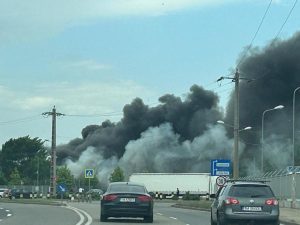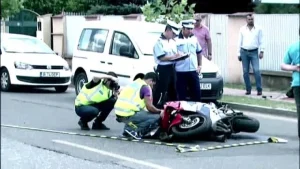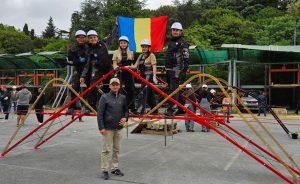
Three hundreds letters – two hundred and ninety nine to be more specific – sent to the Foreign Affairs Ministry by different Romanian embassies between that 19th of April and the 26th of December 1989 are all gathered in a massive volume published by the Publishing House the Romanian Cultural Foundation under the title "1989 – The Principle of Dominoes", edited by Dumitru Preda and Mihai Retegan. The title, hinting to a well-known movie too, has an easily decipherable meaning: this is about the period when the communist regimes in Easter Europe started falling one by one, peaceably in Warsaw, Budapest, Prague, violently in Bucharest. Most of the letters come form the capitals of the countries signing the Pact of Warsaw, but the editors also introduce messages from Beijing, Vienna, London and Washington. These are actually reports and notifications, generally signed by ambassadors themselves, who synthesize the events or register the press’ and the diplomatic media’ s reactions.
The first thing to notice is the fact that Bucharest was informed of anything happened in the other communist countries. Several of the letters also have the merit of using a neuter tone, limiting strictly to describing the facts, others, from the most zealous ambassadors, contain judgements on the dangers that menace the socialist order or on the "inimical", "denigrating" manifestations against Romania. But, as the information are correct on the whole, we could wonder how they were interpreted at the Foreign Affairs Ministry and higher, as it was also sent to cabinet 1 and 2.
I ask myself this question thinking to the contrast between the immobility of the regime in Bucharest, frozen around Ceausescu, and the extraordinary changes in other eastern countries. The book starts with a letter from Warsaw writing about the official registering in court of the Trade Union Solidarity on April 17. It follows the negotiations between the Power and the already formed Opposition at Budapest, and the destruction of the barbed wire fence at the frontier with Austria. In June, in Poland, the Opposition’s victory in the first free elections after the war in a communist country. At the same time, in Tien An Men Square – bloody repression. July – Imre Nagy’s rehabilitation. At the end of August the first street demonstrations start in Prague. October – Honecker’s resignation and, soon, the Berlin wall crumbling. The next is Bulgaria in November and at Sophia the civil society asserts itself more and more. The end of November – the leading role of the Communist party is abolished in Prague, Vaclav Havel seems more and more likely to become the leader of a democratic Czechoslovakia. In the meantime, at Bucharest Nicolae Ceausescu is unanimously reelected within the 14th Congress… We shall wait for the end of December for the regime to fall in Romania too. It is impossible not to notice that Romania is, one again, at the end of the list, and that, on the other hand, all these events were hidden to the Romanians, who only had Radio "Romania Libera" as the only source of information. The party officials were, of course, informed about all this but without showing any reaction. Another, somehow funny, remark, in case we haven’t completely lost our sense of humor: the next day after December 22nd, the ambassadors suddenly change direction and start sending messages by which they unanimously inform that the embassies’ staffs brand Ceausescu’s horrid, criminal dictatorship and declare their enthusiastic adhesion to the new regime. Yet, the ambassadors continue to respectfully address, until December 26th, with the appellation "Comrade"…
P.S. This is how I was ending, on October 20th, my article in the paper: "In a normal country, the competition would be played between the only candidates who have presented by now a coherent and well-grounded program (…): Mugur Isarescu and Theodor Stolojan. In Mitica Dragomir’s Romania (…) a final confrontation between Ion Iliescu and Corneliu Vadim Tudor becomes quite plausible".
Meanwhile, Mitica Dragomir became a parliamentarian, together with Irina Loghin, Ion Dolanescu and Adrian Paunescu.
As for C.V. Tudor, I have written and written about him, I won’t start it again; his simple presence on the political stage is an insult to the common sense.
Ion Iliescu should understand now a fundamental thing: the Romanians who will vote him on Sunday and voted Stolojan, Isarescu and Frunda in the first presidential round only want to live in a normal country.
(Alexandru Calinescu)























